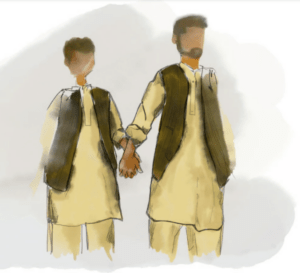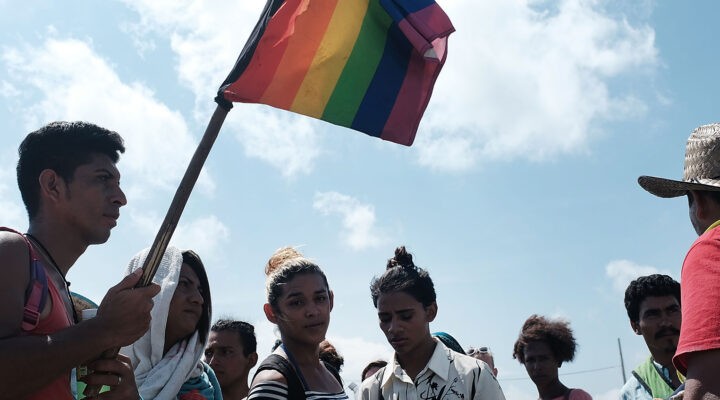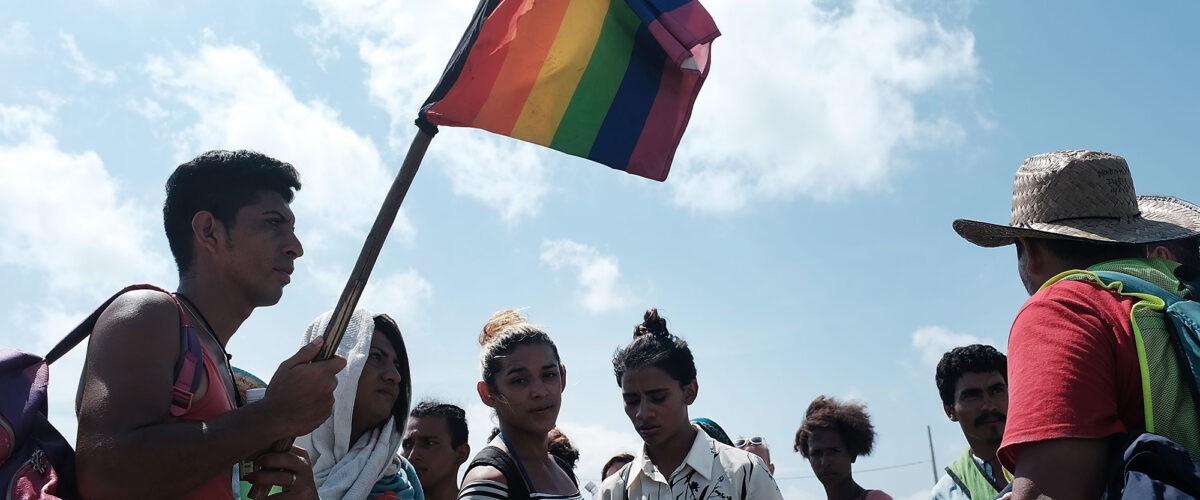While the plight of many people unable to leave the Taliban’s grip in Afghanistan has been well-reported, there’s one group of people facing even more extreme persecution with fewer exit routes: LGBTQ asylum seekers.
Recent reports from organizations tracking the persecution of LGBTQ people have highlighted the dire situation and the need for welcoming countries to help expedite asylum cases of gay, lesbian and transgender persons not only from Afghanistan but also from some Latin American nations.
The studies by Human Rights Watch, OutRight Action International, Refugees International and IRCA CASABIERTA also describe a religiously and culturally motivated torment aimed at LGBTQ migrants and refugees — sometimes from the governments and populations of nations where they initially fled from persecution in their homelands.
In both Afghanistan and Latin America, LGBTQ persecution — including assault and murder — are widespread and frequently leave victims and the organizations that serve them with few, if any, safe options.
Death threats in Afghanistan
Human Rights Watch and OutRight Action International admit it won’t surprise many people that the situation is especially treacherous for gay, lesbian and transgender people in Afghanistan.

Art from Human Right Watch
“Many of those interviewed reported being attacked, sexually assaulted or directly threatened by Taliban members because of their sexual orientation or gender identity,” the group notes in a report titled “Even if You Go to the Skies, We’ll Find You: LGBT People in Afghanistan After the Takeover.”
The documents adds: “Others reported abuse from family members, neighbors and romantic partners who now support the Taliban or believed they had to act against LGBTQ people close to them to ensure their own safety.”
Stoning is one punishment LGBTQ people can face in Afghanistan, the report adds.
No safety in nearby countries
But the danger doesn’t necessarily subside when LGBTQ persons escape Afghanistan, the report continues. “Most of the countries with which Afghanistan shares major borders, including Iran, Pakistan, Turkmenistan and Uzbekistan, also criminalize same-sex relations, as do some other countries in the region. In Iran, same-sex sexual acts can be punished by death.”
Nor did the persecution begin with the Taliban, the report explains: “Afghanistan was a dangerous place for LGBTQ people well before the Taliban recaptured Kabul in 2021. In 2018, the government of President Ashraf Ghani passed a law that explicitly criminalized same-sex sexual relations, and the previous penal code included vague language widely interpreted as making same-sex relations a criminal offense.”
Others interviewed for the study reported enduring sexual violence, forced marriage, assault by family members, blackmail, expulsion from schools and being outed.
“Many were forced to conceal key aspects of their identity from society and from family, friends and colleagues. However, when the Taliban, which had been in power from 1996 to late 2001, regained control of the country in August 2021, the situation dramatically worsened,” the report continues.
“When the Taliban, which had been in power from 1996 to late 2001, regained control of the country in August 2021, the situation dramatically worsened.”
While most interviewees believe their safety depends on reaching countries that protect LGBTQ rights, not many have been able to get to such countries, and the United Kingdom alone has publicly stated it has resettled a small group of LGBTQ Afghans.
“Even if the option to resettle internationally were more widely available, LGBTQ people in Afghanistan face unique barriers to relocation,” the report says. “Gender nonconforming individuals said they were afraid to go to the country’s passport office or even pass through routine checkpoints on public roads for fear of being spotted by Taliban officials. The Taliban prohibits women from traveling without male relatives, so lesbians and bisexual women cannot escape on their own. Many LGBTQ Afghans have conformed to social expectations that they marry a different-sex partner and have children, and they do not want to abandon or uproot their families.”
Grave threats in Latin America
The threats arrayed against LGBTQ immigrants and refugees in Latin American are just as unique and gut-wrenching, according to a report released in January by Refugees International and IRCA CASABIERTA, nonprofits that provide psychological and material assistance to displaced LGBTQ populations in Central America.
“In migrant-sending countries like Guatemala, Honduras, El Salvador and Nicaragua, many LGBTQ people are displaced because of violence, discrimination and insecurity that threatens their lives and well-being,” the report explains.
And because LGBTQ migrants usually travel alone, they also are more susceptible to assault, robbery, murder and kidnapping in the nations to or through which they have fled, the report continues. “Once arriving to the destination countries, like Costa Rica, Mexico and, increasingly, Panama, LGBTQ people may find relative safety, but still face additional barriers to accessing international protection and integration, which accounts for the different needs of LGBTQ people.”
Faith-motivated discrimination
While this population of migrants usually flee the same governmental corruption, economic hardship and gang or cartel violence as other migrants, they face additional social and religious prejudices in their home and destination countries, according to the study. “Interviewees were very concerned about the impact on LGBTQ rights resulting from (the) rise and political influence of very conservative religious movements, often from (the) evangelical community. While some religious organizations are at the forefront of providing care to displaced LGBTQ people, the increasing role of religiously based anti-LGBTQ sentiment in government is a challenge.”
“While some religious organizations are at the forefront of providing care to displaced LGBTQ people, the increasing role of religiously based anti-LGBTQ sentiment in government is a challenge.”
Faith-motivated discrimination also typically extends to the ministries and human rights groups trying to assist gay, lesbian and transgender migrants, the report says.
“Many leaders had colleagues or friends who had been assaulted or murdered due to their work. The leaders expressed worry that they would not be able to continue their work, fearing they might be next. These risks were most notable in El Salvador, Guatemala, Honduras and Nicaragua.”
The situation was found to be even more serious in societies where conservative politics and religion are intwined, the report says.
“Activists and LGBTQ organizations are at the forefront of pushing for political, social and economic inclusion in their respective countries, but are often dismissed or excluded by evangelical politicians who are against making necessary changes for LGBTQ rights. In recent years there has been a growing percentage of ultra-conservative political parties in national legislatures in many countries in Central America.”
As a result, the pressure skyrockets for transgender persons, the report adds. “Trans people faced heightened violence in countries of origin and while on the move. Even in destination countries with lower rates of violence, trans people faced higher rates of violence and discrimination.”
The reason: They often are highly visible and therefore more likely targets of hostility. “Trans women were particularly targeted due to cultural stereotypes and stigma around femininity and the heightened rates of gender-based violence that women typically face,” the report says.
Priority help urged
Both reports urge the U.S. and other nations to invest in nongovernmental organizations that assist LGBTQ migrants, refugees and asylum seekers, and to expedite the resettlement process for that population.
“Displaced LGBTQ individuals are often at higher risk of violence and persecution and need support. Including LGBTQ people in regional protection plans ensures that systems in the region are more robust and inclusive of diverse needs,” the Refugees International/IRCA CASABIERTA report concludes. “Civil society organizations, particularly those led by LGBTQ individuals, are leading the way in providing meaningful, inclusive and lifesaving services to displaced LGBTQ people, but they need resources and more inclusive policies to continue the work they do.”
Editor’s note: BNG follows Associated Press Style in using LGBTQ as the preferred acronym for lesbian, gay, bisexual, transgender and queer persons. The various reports cited in this article use at least three other acronyms to identify the same population. For the sake of clarity, all references have been changed to LGBTQ.
Related articles:
Pressure mounts on White House to rescind another Trump immigration policy
The church is losing its way | Opinion by Rob Sellers


